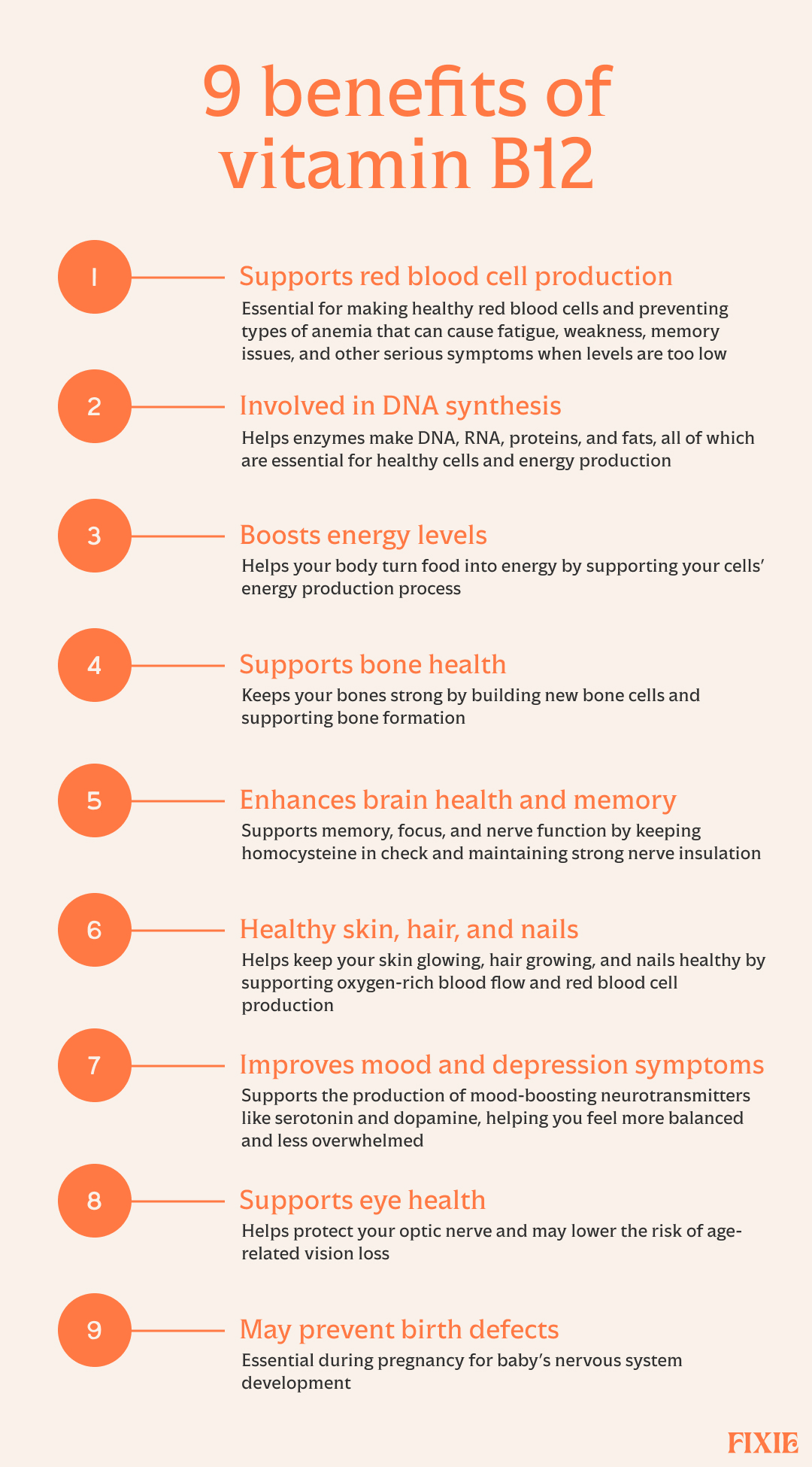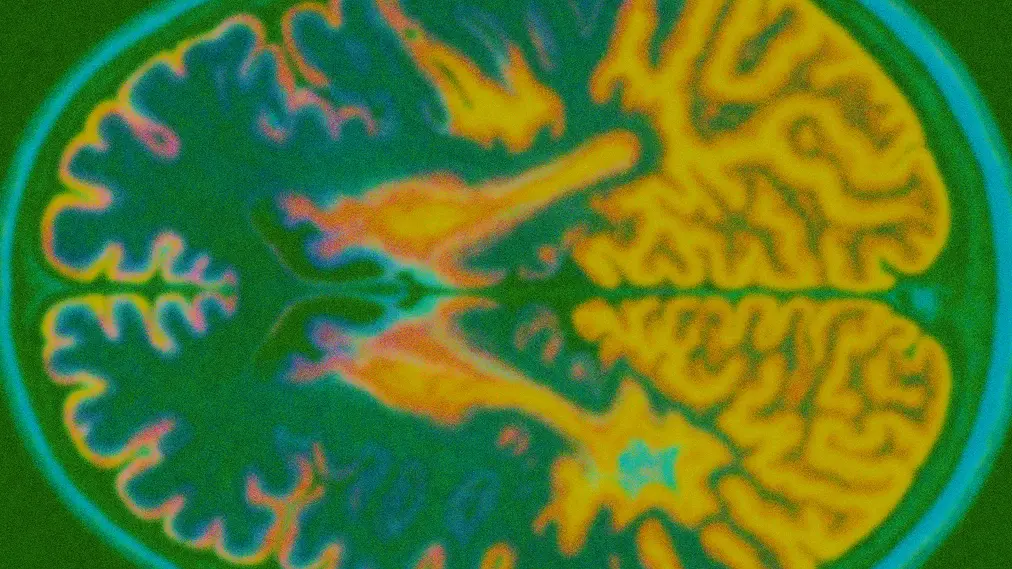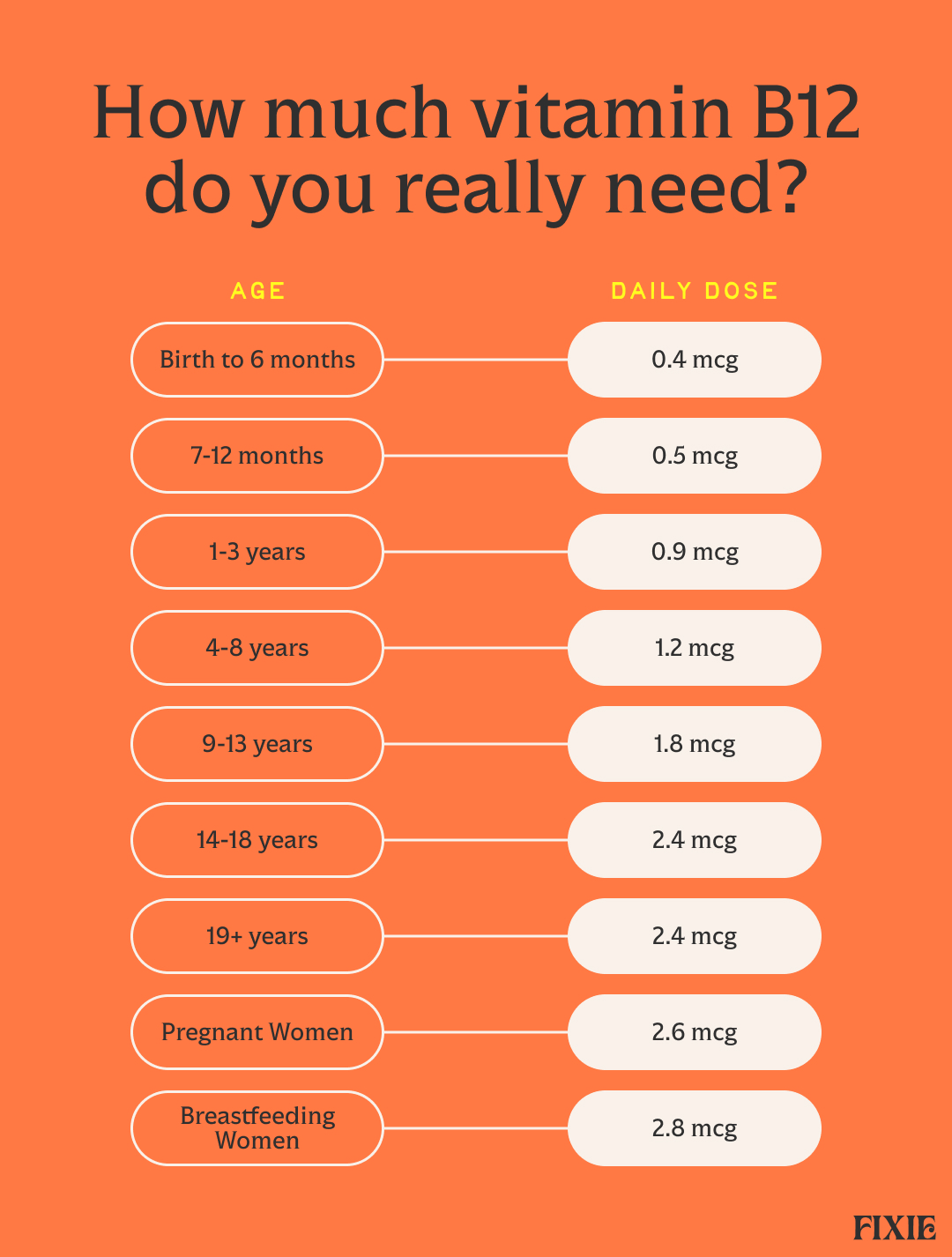Health Benefits of Vitamin B12: A Complete Guide

Feeling tired, foggy, or hardcore meh, even with a healthy lifestyle? It might not be those late-night doom-scrolling sessions—you could actually be low on vitamin B12. This essential nutrient supports everything from energy levels and mood to the health of your hair and nails. Keep reading to learn about vitamin B12 benefits and the importance of supplementing if you're running low.
As a working mom of three littles under six, I move (more like sprint) through life half-asleep. It looks like this: Me, clutching a cup of coffee I’ve microwaved three times, lugging a diaper bag bursting with snacks (none for me, of course), and scratching my head wondering if I actually ate today. With so many responsibilities to juggle, it’s easy to chalk up my constant fatigue, fogginess, and poor focus to the chaos of motherhood. But what if there’s more to it? What if this constant groggy, out-of-it feeling isn’t just mom life, but a sign that something’s missing?
If that sounds all too familiar, vitamin B12 might be the sneaky culprit behind your mom-brain-meets-brain-fog feeling. This vitamin plays a key role in how your body and brain feel, and helps bridge the gap between feeling drained and actually getting stuff done.
In this article, we’ll explore vitamin B12 benefits, what happens if you’re not getting enough, and easy ways to supplement so you can feel more like yourself again (you know, the version that actually remembers where she put her phone, keys, or sanity).
What is vitamin B12?
Growing up in Los Angeles, I’m all too familiar with seeing ads for vitamin B12 shots plastered on every palm-tree-lined street corner, promising a magic boost of energy and focus. From a young age, I had a pretty good idea of what the vitamin B12 buzz was all about, so here’s the scoop.
Vitamin B12, also known as cobalamin, is an essential nutrient that your body cannot make on its own. That means you’ve got to get it from food or supplements. Vitamin B12 has its hand in many bodily functions—it helps convert food into energy, forms red blood cells, regulates the nervous system, and supports DNA production.
Vitamin B12 quietly works behind the scenes to keep you energized, mentally sharp, and running as your best self. “This vitamin plays a vital role in nerve cell health and energy metabolism, which is why it gets a lot of attention for energy and focus,” says Trista Best, MPH, RDN, LD, Registered Dietitian and Adjunct Nutrition Professor. So if you’re feeling drained or a bit hazy, it's no wonder B12 often comes under the spotlight—it powers so many essential processes that help you feel like you.
9 benefits of vitamin B12
Vitamin B12 is essential for nourishing both your body and brain, helping you stay sharp and ward off all-too-familiar brain farts. Here are the top 9 ways vitamin B12 supports your health:

Supports red blood cell production
Vitamin B12 plays a crucial role in the production of healthy red blood cells. These cells carry oxygen throughout your body, and without enough B12, your body can develop megaloblastic anemia—a type of anemia marked by fewer, unusually large, and underdeveloped red blood cells. “Without adequate B12, red blood cells are at risk of becoming misshapen, which results in an inability to carry oxygen, which can lead to anemia, weakness, and fatigue,” says Best.
Symptoms of B12 deficiency go beyond snooze-inducing fatigue and feeling spaced out. You might also experience:
- Heart palpitations
- Paler-than-normal skin
- A swollen, inflamed tongue
- Neurological issues like numbness or tingling in your hands and feet
- Loss of appetite
- Weight loss
- Poor memory
- Depression
In some cases, vitamin B12 deficiency is caused by pernicious anemia, a condition where the body can’t absorb B12 properly due to a lack of intrinsic factor, a protein made in the stomach. This can result from an autoimmune reaction or a thinning of the stomach lining. Symptoms may not appear until your 30s or later. When this happens, you may also start to notice memory blips (wait…did I turn off the oven?), poor appetite, and an overall sluggishness that leaves you craving a serious pick-me-up (double shot of espresso, please).
Involved in DNA synthesis
Vitamin B12 acts as a cofactor (helper molecule) for enzymes involved in DNA synthesis—the process by which new DNA strands are created. DNA carries the genetic instructions for how each cell in the body is built and how it works, so B12 is essential for healthy cell structure and function. B12 also helps produce RNA (another type of genetic material), along with proteins and fats that our body uses for energy and other physiological functions.
Supports energy levels
Vitamin B12 helps convert the food you eat into usable energy. It’s involved in breaking down nutrients and transforming them into fuel that your cells can use to power your day. Erika Gray, PharmD, Chief Medical Officer of ToolBox Genomics explains that your mitochondria (think of them as tiny power plants in your cells) rely on B12 to help produce adenosine triphosphate (ATP), the body’s main energy currency. This process keeps your energy levels up and your body functioning efficiently.
That said, vitamin B12 doesn’t directly give you energy like caffeine might—it simply supports the body’s natural energy-making process. So if you’re feeling sluggish, it might be due to anemia caused by a vitamin B12 deficiency—not because you need a quick energy boost from B12 itself.
Supports bone health
Ever since learning about osteoporosis in women’s health class, I’ve been laser-focused on keeping my bones strong as I age. Osteoporosis is a chronic bone disease that affects one in three women over age 50, and interestingly, this is one of the benefits of vitamin B12 for women.
Vitamin B12 keeps your bones strong by building new bone cells and supporting bone formation. In fact, low vitamin B12 levels are associated with lower bone mineral density and a higher risk of fractures—yet another reason to make sure you're getting enough.
Enhances brain health and memory
Remember those brain farts I mentioned? They could be tied to low B12 since it’s involved in homocysteine metabolism, a process that affects many systems in the body, including the nervous system. When vitamin B12 levels are low, homocysteine levels rise, and several studies have linked elevated homocysteine to an increased risk of Alzheimer’s disease and dementia.
One reason may be B12’s role in the production of myelin, the protective sheath of fat and protein that surrounds and insulates nerves, including nerves in the brain and spinal cord. Myelin efficiently transmits electrical signals throughout the nervous system, and without enough vitamin B12, the myelin sheath can weaken and can slow down communication between your nerves. Enter: brain farts, memory loss, and neurological symptoms like tingling and numbness in your extremities.
Healthy skin, hair, and nails
As I get older, I’m low-key obsessed with not looking like the perpetually tired zombie mom. As I mentioned, a symptom of vitamin B12 deficiency is paler-than-normal skin, and that’s because your body isn’t producing enough healthy red blood cells to carry oxygen to your skin, robbing you of that fresh, vibrant glow. In fact, vitamin B12 deficiency is associated with skin hyperpigmentation (patches of dark spots), linear streaks in the nails, and poliosis, a condition where you develop white streaks in your hair.
Your B12 levels also impact hair and nail health. Vitamin B12 benefits for hair include ensuring that hair follicles get enough oxygen-rich blood, because without it, you might notice slower growth, hair thinning, or even premature graying (*gasp*). And when it comes to nails, low vitamin B12 has been linked to nail hyperpigmentation—discoloration or dark spots that show up in your nail beds.
Improves mood and depression symptoms
If you’re constantly juggling endless to-dos, neverending snack refills, and the occasional Lego landmine ready to trip you up, it’s no wonder you feel hazy, weary, and totally overwhelmed (yep, that’s me—hi!). And let’s be honest, when you’re frazzled and overstimulated, a sour mood isn’t far behind. At least that’s how it goes for me. Here’s how vitamin B12 can help turn things around, if you’re not getting enough.
“B12 is critical for supporting the production of neurotransmitters such as serotonin and dopamine,” says Gray. “These are your body’s key neurotransmitters that support mood and may improve mood disturbances and depression symptoms.” Serotonin and dopamine are often referred to as the “feel-good” hormones because they promote feelings of happiness, pleasure, reward, and motivation. So when your body is circulating enough of these neurotransmitters, it’s easier to feel better—and less like a grumpy mess.
Supports eye health
Vitamin B12 could reduce the risk of age-related macular degeneration, an eye disease that affects vision. “Low B12 levels could lead to demyelination of the optic nerve, leading to blurry vision,” explains Gray. In other words, the protective coating around your optic nerve can get a little frazzled, which puts your vision at risk. The good news? If a deficiency is caught early, it’s usually easy to fix with a bit of B12 TLC.
May prevent birth defects
When I think about a healthy pregnancy, folic acid or folate comes to mind. But vitamin B12 is just as important and often overlooked. It supports the development of the baby’s central nervous system, and not getting enough during pregnancy can lead to serious health issues like poor growth, delays in brain development, and birth defects. This highlights one of the key vitamin B12 benefits for women, especially during pregnancy and breastfeeding, when daily requirements increase.
How much vitamin B12 do you need?
The amount of vitamin B12 you need depends on your age and life stage. Here are the Recommended Dietary Allowances (RDAs) to help guide you:
Frequently Asked Questions
If you’re feeling totally wiped out, dealing with brain fog, or notice that weird numbness and tingling sensation, it could be early signs of a vitamin B12 deficiency. If you notice these symptoms, it’s a good idea to check in with your healthcare provider and get tested.
Vitamin B12 doesn’t directly give you energy, but it supports the body’s natural energy-making processes to help you feel recharged.
Too much of any vitamin can be harmful. While vitamin B12 supplements are generally considered safe, taking excessive amounts can lead to side effects like nausea, gastrointestinal issues, and a rash. It's important to understand both the vitamin B12 benefits and side effects to make informed decisions about supplementation.
Vitamin B12 supports healthy red blood cells, which delivers oxygen and nutrients to your scalp and hair follicles. This can help nourish your hair and promote hair growth.
Many people can get enough vitamin B12 from a balanced diet that includes animal proteins. If you follow a vegan or vegetarian diet, or if you’ve been diagnosed with a B12 deficiency, your doctor may prescribe vitamin B12 supplements daily, weekly, or monthly to make sure you’re getting enough. A few health benefits of vitamin b12 may include: increased energy levels, healthy skin, hair, and nails, and better mood.
Latest Posts


%20(1).JPG)




.svg)

.jpg)


.jpg)
